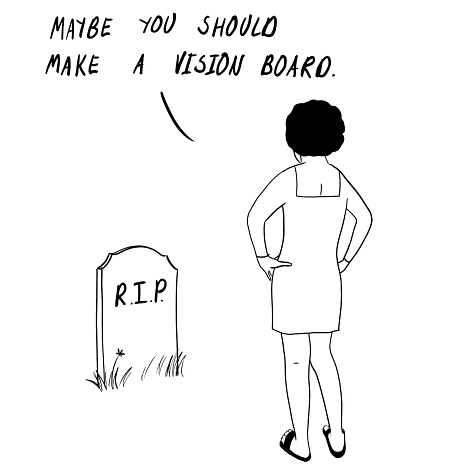Chronic Chronicness
Diagnosis, pop-psychology, and the wellness industry's obsession with quick fixes
Diagnosis can be liberating and, at the same time, feel like a life sentence with zero chance of parole. There’s an overwhelming grief that comes with finding out you are going to have to manage a condition for the rest of your life—especially as that usually comes with learning you may not be able to do the things you wanted for yourself, your family wanted for you, or your peers already have. It may come with the realisation that full-time work will never be attainable, or that you may not have the physical capacity to have children that you just assumed you would. And it is beyond frustrating when your therapist or GP tells you the only source of peace is acceptance.
Although diagnosis is not your entire personality or identity; it is very much a tool or guide to support you in getting the correct resources to be well, manage symptoms, and know which specialist to be referred to. But it’s extremely difficult to separate yourself from a diagnosis which you have to carry and tend to for the unforeseeable future, and that makes it extremely tempting to search for quick fixes and to buy into promises of cures.
I’ve often wondered what pop psychology does to people suffering from severe chronic conditions, whether mental or physical. I wonder if people had the same experience as me. I think it was one of the reasons it took me so long to recognise that I had an illness that was well beyond the ‘normal’ range.
The overuse and oversimplification of serious medical conditions—like using OCD to describe how you like neatness, or bipolar to describe how your mood changes when you’re hungry—seriously contributes to the misunderstanding of people who are genuinely affected. Reducing a serious medical condition to a personality quirk or a way to describe an everyday struggle, like keeping your car clean, is cruel.
And what is especially cruel is using these terms to sell people products or courses with promises of an instant fix. "Feeling unmotivated? You could be struggling with hidden trauma. Take our 6-week healing course!" Over-pathologising—where normal human emotions get labelled as illnesses—is an effective sales technique. Encouraging people to build an identity around a diagnosis encourages them to see themselves as the issue — forever needing more products to better themselves.



It really upsets me when I see people claiming to be trauma specialists when the only qualification they have is a 5-day online coaching course and a few years of meditation practice. When untrained wellness practitioners inflate problems, simplify solutions, and position themselves as a necessary guide, they are profiting from people’s confusion, vulnerability, and desperation to feel better. I’ve heard yoga teachers use expressions like “I’m going to crack you wide open” in just an ordinary vinyasa class. I don’t think these people have ever seen a trauma response—where a person has been triggered in an unsafe and unsupported environment and subsequently re-traumatised—which can take a long time to come back from.
I recently spoke to a clinical psychologist about online life coaches taking on clients with PTSD or serious life trauma, and the first thing she said was: “You never fuck around with trauma.” She talked about the thousands of hours under supervised clinical practice it takes to learn how to ensure a person is stabilised before trauma processing, and the deep respect required for a patient's pace. She talked about the difference between evidence-based practice and releasing ‘stuck energy’ through a digital course or five coaching sessions. Another thing she brought up, that I hadn’t considered, is that an untrained person acting as a trauma specialist could actually traumatise themselves.
When I was in my early twenties, I bought into detox diet programmes, coaching sessions, and expensive meditation courses, all in the hope of curing chronic illness. And the reason I bought into these products is that they were marketed as a sure fix. So when it didn’t work, I was left more devastated and hopeless than I was before, and I further developed a belief that it was my fault I wasn’t getting better—that I wasn’t trying hard enough, or I wasn’t evolved enough.
If I were going to be especially cynical, I would be questioning the motivation of online coaches. I’m sure that they do want to help people, but I wonder whether they want to work remotely more. When I was based in Bali, hordes of people came searching for career options that would allow them to work online from anywhere in the world. I really started to notice the language that was used in promoting their services and products. I started to note it down for an essay I was working on for my Master’s. I thought I’d share it here, in case anyone is interested:
1. Creating a false sense of pathology
Marketers imply that normal emotions (like sadness, tiredness, boredom, insecurity) are signs of a serious issue you urgently need to fix.
"Feeling unmotivated? You could be struggling with hidden trauma. Take our 6-week healing course!"
2. Offering easy "cures" for complex conditions
Since real mental health treatment can be long, hard, and messy, products promise quick fixes for serious disorders they're misrepresenting.
"End your anxiety forever with these three simple mindset hacks — only £299!"
3. Over-diagnosing to create a bigger market
The more people who think they have a problem, the bigger the customer base.
"Do you procrastinate sometimes? You might have undiagnosed ADHD — download our productivity toolkit!"
4. Using authority signalling with pop-psych language
Throwing around diagnostic terms makes a product or coach seem knowledgeable and credible, even if they have no clinical training.
"I'm trauma-informed and use somatic healing to regulate your nervous system!" (often without any professional certification)
5. Shaming people subtly into buying
By framing everyday struggles as evidence of being "broken" or "unhealed," marketers position their offering as the only solution.
"If you're not investing in your healing, you're choosing to stay stuck."
6. Building an identity around the diagnosis
People are encouraged to see themselves as their “issue” and thus always need more products or coaching to “work on themselves.”
"You're a highly sensitive person (HSP)! Here's our HSP survival kit subscription service."
I am not saying that all online coaching is bad! I know plenty of people who have been helped by experienced, specialised, and informed coaches who have genuinely supported them in improving their lives. I guess what really upsets me is the thought of people in the most vulnerable positions of their lives—maybe at the beginning of rebuilding or starting over—being targeted by twenty-year-old influencers with a strong skill set in digital marketing, promising cures for serious and chronic conditions that require careful and long-term care.
Maybe some of you will disagree with me on this one—that’s OK. I’m open to discussion. As someone who worked in the wellness industry for years I do feel like I’m in a unique position to talk about it and I’m going to continue to write about it. Look out for future newsletters on the focus of individualism in the wellness sector, how MLMs have infiltrated the space and stories of when well-intentioned approaches caused unintended harm.










Shared to Facebook. A very well written and informative article on the thousands of hucksters and vacuous cheats and creeps out there who like to believe, and convince people who really need professional qualified advice and help, that they, and only they, possess the secret to an eternal and healthy, healed life.